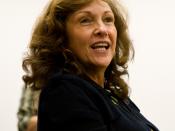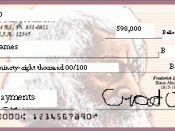Literacy- The Path Trough Adversity
Frederick Augustus Washington Bailey was born a slave on February of 1818, on a plantation house in Maryland (Blight). He later changed his name to Frederick Douglas (A&E video). His mothers name was Harriet Augustus, but Douglas did not know much about his father. Frederick separated himself from other slaves in that he learned how to read. He used Tommy Auld's spelling book to memorize the letters of the alphabet. Frederick also received help from his master's wife Sophia (A&E video). Unfortunately, when his master found out about his wife's teaching of a slave, he put an immediate end to it, stating that teaching slave was "unlawful, as well as unsafe" (Douglas 128). Still Frederick persisted and eventually fled to New England where slavery was illegal. There Frederick wrote about his life as a slave and grew to become a great orator. He died at age 78.
Throughout his life, Frederick Douglas dealt with much adversity, and he could not emphasize enough the fact that literacy was and still is the path to freedom.
The American heritage dictionary defines literacy as "the ability to read and write". There is a lot more to literacy that can be explained. Literacy can also be seen as a path. The path can lead people out of despair and into greatness. The path can make anyone's life better if they chose to embark on it.
The first step taken by Douglas to becoming literate was first discovering that "there was a connection between the letters on a page and the movements of a readers lips, a nearly one-to-one correlation between the black squiggles and the sounds uttered" (Sagan and Druyan 4) He was also aware that "withholding knowledge was the white man's power to enslave the black man and...


